Battery-powered handler ticks the boxes
11th July 2022
One of the first battery powered JCB Loadall telescopic handlers to be supplied in the UK has started work at a large Cambridgeshire nursery. David Williams reports.
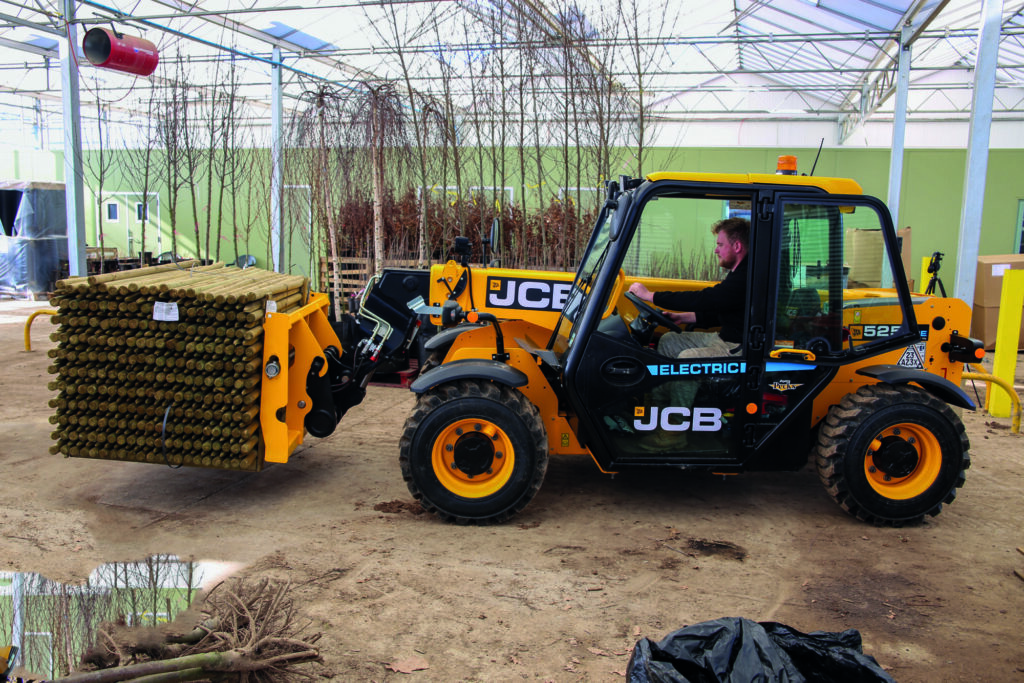
The Loadall 525-60E shares similar operating capability to the popular and proven 525-60 diesel machine, including 2.5t lift capacity and maximum 6.0m maximum lift height. Wisbech-based Tamar Nursery produces and supplies trees and plants from two sites just a few miles apart. Most sales are to retail customers, but the nursery also supplies landscaping businesses, and the trade. The electric Loadall was ordered last summer, and managing director Johan Huibers said it ticks all the right boxes for the operation. “We are self-sufficient in electricity and generate it from solar panels on-site. We already operate several electric-powered machines including a much smaller handler and they perform well, so when our existing Loadall was due to be updated – replacing it with the equivalent new battery version made sense,” he told Farmers Guide.
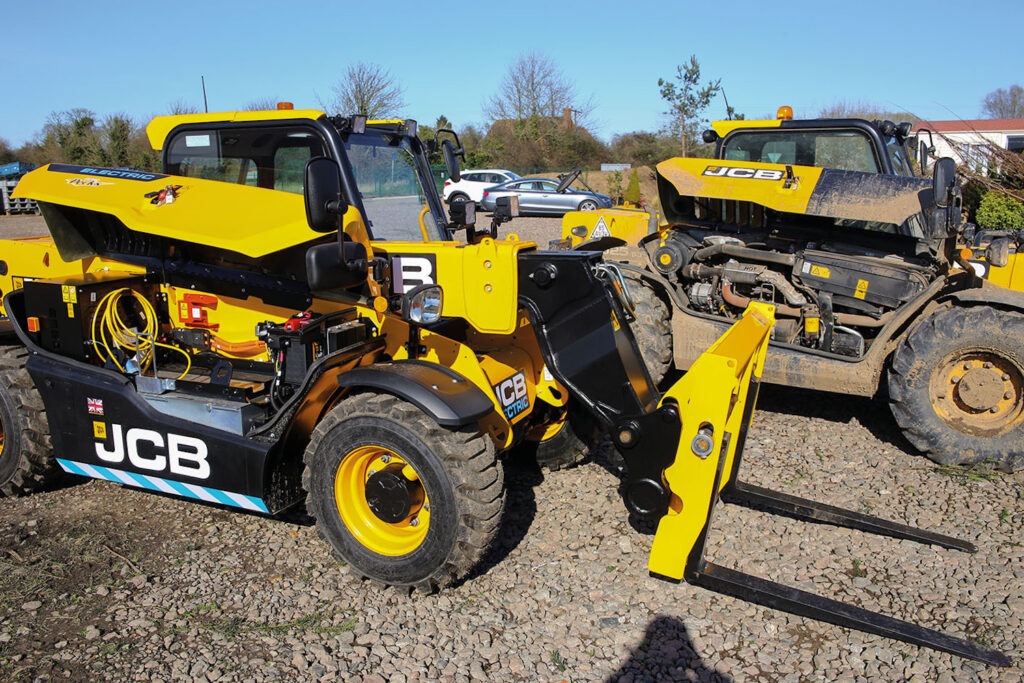
The new 525-60E battery machine (left) replaced a 525-60 diesel model which had been operated by the business since 2019.
Convenient and environmentally friendly
The new 525-60E is the fifth successive JCB Loadall operated by the business. Local main dealer Pecks has supplied and looked after all the machines, and area sales manager Matt Buddle said he believes that the 525-60E is ideal for the application. “There has been huge interest in the electric Loadall since it was announced in late 2020,” he said. “Diesel models remain the preferred option for most farms currently, but there are situations where battery power is an advantage and these include where machines are working indoors, as well as where electricity is produced on-site and can be used for charging. Battery-powered handlers can also contribute to a company’s green credentials which is becoming a priority for businesses supplying wholesalers and large supermarkets and there are many of these in our trading area.
“We believe the 525-60E will prove popular and we already have lots of requests for demonstrations. Technology is evolving all the time, and we hope to have a wider range of models and sizes in future so that we can offer the battery option to more customers.”
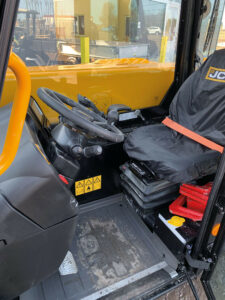
The cab of the 525-60E is like the 525-60, but main operator Jake Fowler said that he prefers the revised control layout and believes the electric heater and three heated screens will offer advantages for cold weather application.
Not a converted diesel
The electric Loadall offers identical performance to the 525-60, but dual electric motors separately power the wheels and hydraulics, instead of the diesel engine.
The main battery is under what would otherwise be the engine hood, and a separate 12V conventional battery provides power for the cab systems. An on-board 34kW charger allows the Loadall to be plugged in and charged from a three-phase supply in eight hours for a full charge, or five hours from 25% which better reflects predicted typical use.
The Loadall’s lithium-ion battery is maintenance-free with a predicted 2,000-cycle working life while retaining 85% of its new capacity. After 5,000 cycles the capacity remains over 80%.
Hydraulic power is from a 22kW motor driving an 80-litre/min gear pump. The wheels are driven by a 17kW motor. Power is recovered during deceleration to extend battery life, and there is no conventional front brake.
The cab is also like the diesel machine, but the front, rear and right-hand windows are heated. The seat is also heated and there is a 2kW fan heater. Hydraulic functions are all through the main joystick and the operator can change direction using a shift lever by the steering wheel, or a joystick-mounted switch. The steering has three operating modes.
Although the 525-60E boasts the same performance figures as its diesel sibling, there are situations where it out-performs it. The diesel engine’s maximum power is shared between all the systems so in heavy working conditions as the revs reduce under load, the hydraulic performance becomes slower and there is less torque at the drive wheels. Even when the wheels of the battery machine require full power, the hydraulic performance is not affected. However, whereas multiple hydraulic functions can be carried out simultaneously on the diesel model such as when lifting and extending the boom and tipping the attachment – only single actions are possible with the battery version to make the most of the performance of the gear-driven pump.
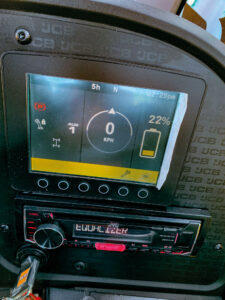
The main control display prioritises remaining battery capacity.
Battery model advantages
At Tamar Nurseries, the Loadall’s main roles include handling compost, unloading lorries, and moving large potted trees around the site. The business currently operates from two sites a few miles apart, and the handler will travel between, and be used at, both locations. “Our 525-60 diesel handler has been excellent since its arrival in summer 2019,” explained production manager and main operator Jake Fowler. “We depend heavily on the handler. It’s used more than almost any other machine, and during almost 1,700 hours of operation in two and a half years, it has been almost totally reliable.”
Jake commented that the electric model offers advantages. “It’s so much quieter and as half of its work is inside the buildings, it will be preferred by others working nearby. It will be safer as the driver can hear what’s going on around the machine, and the lack of diesel fumes will improve the working environment too.”
Confidence in dealer
Matt said that although this is the first electric Loadall supplied by Pecks, the workshop team has already received full product training.
Jake stressed that he has no worries concerning reliability or the dealer back-up. “Our previous experience of Loadalls means we don’t expect problems, but if we need advice or if issues do occur, then someone from Pecks will be available to help. The sales and service teams are excellent.”
Long operating times
When the electric Loadall is temporarily stationary during handling tasks, then no power is consumed where diesel engines often continue idling. Matt said that between five and six hours of operation is predicted before charging is needed, equivalent to more than a full day’s typical use for most applications. “That will be plenty for us and should meet our requirements even during the busiest periods,” confirmed Jake.
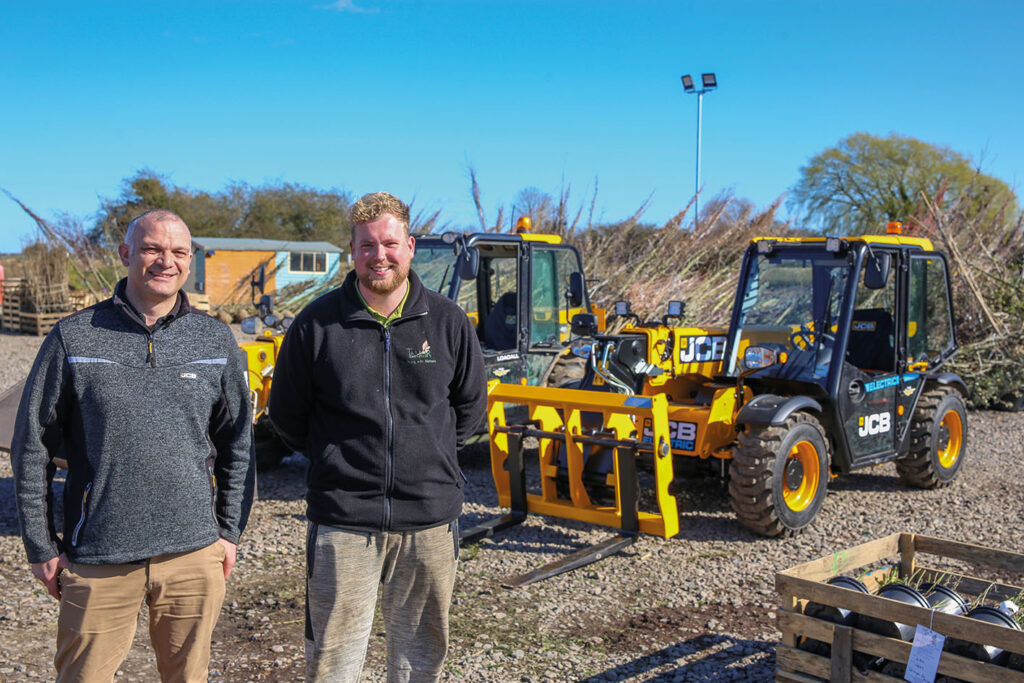
Pecks area sales manager Matt Buddle (left) with Jake Fowler.
Although the new Loadall is similar to the previous diesel machine, Jake said that he prefers the new cab design. “The main controls are similar, but others have been relocated from the front console to the right-hand panel which makes them more accessible. There is extra seat comfort and legroom. The electric cab heater and electrically heated windows will be an advantage on cold mornings as they will remain clear from the start, whereas previously we had to wait for the diesel engine to warm up.
“As soon as I tried the controls I found them more responsive, but they are more progressive too, and cycle times seem faster. Apart from the reduced operating cost and added convenience associated with powering the machine using electricity generated on site, the main advantage for us is the quiet operation. We didn’t try or even view the new 525-60E until ours arrived, but from what I have seen so far it will be ideal. I’m very happy with it.”
